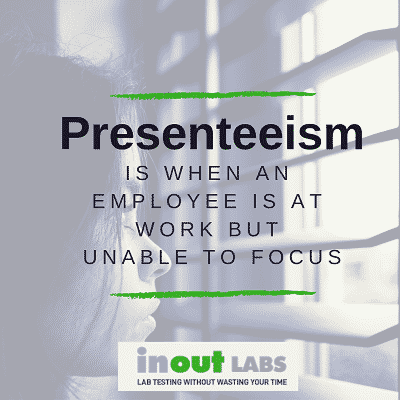 Occasionally, you may go to work even though you’re feeling a bit “off.” Maybe it’s a cold or your stomach isn’t quite right. You may even be running a fever. But the thought of missing a day on the job creates more anxiety than it’s worth. So you go. You may not accomplish much, but at least you’ve shown up. It’s called “presenteeism,” which hinders productivity and can sometimes foster the spreading of illness in the workplace. It also costs companies billions of dollars a year.
Occasionally, you may go to work even though you’re feeling a bit “off.” Maybe it’s a cold or your stomach isn’t quite right. You may even be running a fever. But the thought of missing a day on the job creates more anxiety than it’s worth. So you go. You may not accomplish much, but at least you’ve shown up. It’s called “presenteeism,” which hinders productivity and can sometimes foster the spreading of illness in the workplace. It also costs companies billions of dollars a year.
Substance abusers experience it a lot, whether it’s due to a hangover or the “brain cloud” that results from drug abuse. Not only do they not feel well, they also are simply not fully present.
Presenteeism is characterized by an inability to concentrate, or complete tasks efficiently, or even correctly. Low energy can result in poor or lazy communication with coworkers or clients.
Yes, everyone has bad days. Still, if an employee cannot function properly the results can be costly. Revenue may be affected, relationships can suffer, and safety in the workplace is put at risk. Imagine a substance-abusing forklift operator who’s not particularly “sharp” on a Monday morning — or any day of the week — who accidentally backs into a coworker, shattering his ankle. Or the bank teller counting change for a customer but loses track of the $100 bills. Or worse, the teller pockets a few of the bills to score some cocaine for the weekend. It may sound like a TV script, but it happens.
Ever been in an office during March Madness when everyone is preoccupied with his/her bracket? Not a ton of work gets done. The drug abuser, though, is preoccupied ALL the time, trying to find the next high, or the cash to pay for it. It’s not just March. It’s January through December.
And that’s assuming he’s at work. People who abuse drugs and alcohol miss more work than those that don’t. According to a 2009 report from the U.S. Department of Health and Human Services, Substance Abuse and Mental Health Services Administration, an “estimated 500 million workdays are lost annually due to alcohol abuse.” The same study states, “Employees who use drugs are twice as likely to request early dismissal or time off and are two and a half times more likely to have absences of eight days or more.” This data alone points to the importance of making testing a part of every company’s absence management program.
An employer can control only so much. Maintaining a workplace that is drug- and alcohol- free by testing employees is one way an employer can create a safe and healthy workplace. A fully present —and engaged—workforce leads to increased productivity and safety, something we can all appreciate.

